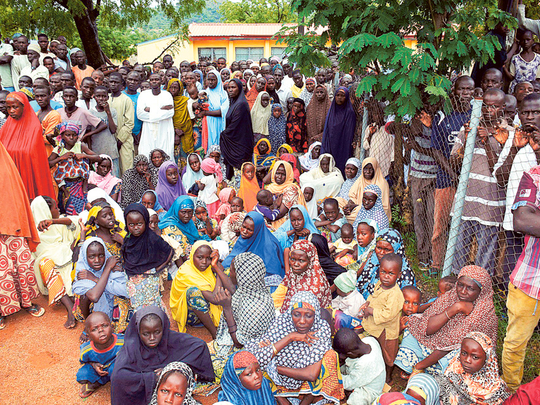
Kano, Nigeria: Boko Haram on Monday overran a border town in northeast Nigeria, forcing residents and soldiers to flee in the latest indication of the militants’ growing ability to strike at will and unchecked.
The attack on Gamboru Ngala came after the town was almost entirely destroyed in a devastating assault in May that left more than 300 people dead and prompted outrage at the lack of military response.
Many residents sought refuge from the latest strike across the border in the northern Cameroon town of Fotokol, where Cameroonian troop reinforcements were sent, a security service source told AFP.
Nigerian soldiers were said to be among the exodus, according to locals and the Cameroon military, who said “more than 450” had fled their posts on Sunday from elsewhere in Borno state in fear of Boko Haram attacks.
Nigeria’s military dismissed the claims and maintained that the troops were “charging through the borders in a tactical manoeuvre” when they found themselves on Cameroonian soil.
Several residents who made it across the frontier said the militants had taken over the town after the assault began at about 5:30 am (0430 GMT), with fierce gunfire throughout the day forcing some frightened residents to lock themselves in their homes.
In Fotokol, residents also reported hearing “intense” fighting.
“Boko Haram is in control of Gamboru Ngala. They have taken over the Harmony [military] camp, the police station and the customs barracks near the border,” Idris Gwoni said on Monday evening, in an account supported by other locals.
“They encountered stiff resistance from the military, who engaged them in gun battle for several hours, but the soldiers were subdued and forced to flee into Cameroon.
“The insurgents have not touched any civilians and allow residents to stay or leave. I decided to leave because I can’t trust Boko Haram.”
Cameroon said on August 18 that it had closed its vast border with Nigeria to guard against the spread of Ebola, which has caused five deaths in Nigeria’s financial capital, Lagos, in the far southwest.
But few believed that Cameroon had the resources needed to seal all the possible crossing points along the roughly 1,600-kilometre frontier.
Boko Haram, which has been blamed for more than 10,000 deaths in a five-year-old uprising, has in recent weeks sought to take over a number of towns in Nigeria’s Borno state.
The apparent holding strategy is a shift from its previous hit-and-run tactics, which has increasingly targeted civilians and seen whole towns and villages razed.
The group’s leader, Abu Bakr Shekau, declared in a video obtained by AFP on Sunday that the town of Gwoza, southwest of Gamboru Ngala, was now under an Islamic caliphate.
Local officials and residents in Borno say Boko Haram may be in control of a key road that connects Gamboru Ngala to the state capital Maiduguri.
Establishing which parts of the area have in fact fallen into rebels hands is difficult in the remote region, where travel is dangerous and prolonged fighting has hit mobile phone networks.
In Sunday’s video, Shekau did not develop his claims about Gwoza being part of the Islamic caliphate.
He has previously voiced his support for the leader of the Islamic State of Iraq and the Levant (Isil) militants, Abu Bakr Al Baghdadi, who proclaimed himself the “leader of Muslims everywhere” in June.
Nigeria’s military dismissed Shekau’s claim as “empty”, maintaining that the country’s sovereignty remained intact.
But that assertion is in conflict with multiple reports indicating that Boko Haram controls several towns in Borno and at least one in neighbouring Yobe state.
Analysts believe that Boko Haram will attempt to hold more towns in the state in the short to mid-term, with Nigeria’s military unable or unwilling to tackle them.
Some Nigerian troops stationed in Maiduguri have refused to deploy to retake Gwoza because of what they say are sub-standard weapons that leave them at the mercy of the better-equipped rebels.
Defence analysts have also argued that Nigeria needs to improve its counter-insurgency strategy and adapt to guerrilla fighting, rather than relying on conventional means.
Others complain of a lack of political will to properly tackle Boko Haram, which wants to establish a hardline Islamic state and whose campaign has targeted schools, churches and government installations.












